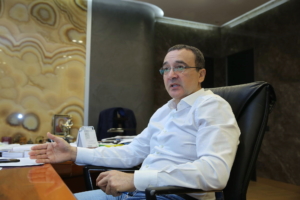Kyiv authorities are facing a swelling challenge: not enough kindergartens.
Part of the problem is just population growth. While Ukraine’s overall population has shrunk to 42 million over the past four years, Kyiv’s metropolitan area keeps growing — to about 3 million people — as people in rural areas seek better opportunities in the capital.
But part of the problem is profit-hungry developers. A longstanding city regulation requires all construction firms building residential developments to allocate 1.2 hectares for an on-site kindergarten.
Authorities and residents, however, say that this law is ignored in the interests of commercial development.
This year, Kyiv City Administration estimates that almost 3,800 children are on waiting lists to get into kindergartens, with some parents filling out kindergarten applications immediately after their children are born.
Kyiv authorities are mulling a stricter rule that requires developers to place a kindergarten on the first floor of every residential building, according to the Ministry of Regional Development and Construction.
Reliable companies?
It’s difficult for Kyiv residents to know where to buy. Developers will often fool potential buyers by including social infrastructure, such as medical centers and fitness centers in plans, as well as spacious parking, schools and kindergartens.
But, once construction is finished, residents move in to find that the promised benefits don’t materialize. The trees aren’t planted and the nearest kindergartens are out of the district.
One such instance provoked an outcry late last year when local media reported about a scandal involving a residential complex along Solomii Krushelnytskoi Street in Kyiv’s Osokorky district.
StroyObzor reported in November 2017 that owners who had invested in apartments under construction protested when a promised public school with swimming pool and stadium did not materialize. Instead of putting in a school, the developer, Zhitloinvestbud-UKB, planned to build two more residential buildings. The press service of Zhitloinvestbud-UKB refused to comment.
The lack of kindergartens is an even more serious problem. Currently, the most overloaded districts in Kyiv are Darnytsky and Svyatoshinsky, forcing parents into years-long waiting lists or suffering the inconvenience of having to take their child to another district.
Perverse Incentives
The incentives to ignore city legislation are high since money can be made by selling apartments on the 1.2 hectares allocated for kindergartens in each building.
But even developers who do build public kindergartens run into problems. Authorities are often not in a hurry to recognize the kindergartens, as it’s expensive to fill the space with equipment, hire teachers and pay for communal payments.
“After the kindergarten has been built, the city simply refuses to consider it in the balance. Perhaps, because there is nothing to earn money from,” said Glieb Shemovniev, press secretary of constructing corporation Ukrbud.
The online news portal MinFin keeps a list of reliable construction companies in Kyiv, based on the number of residential units they’ve planned and completed. Among them are Ukrbud, Zhitlobud, Arcada, Intergal-Bud and Comfort Life. However, Olena Terestchenko, a coordinating board member of the non-governmental organization Kyivske Viche, says that many of these construction companies have close ties with Ukraine’s lawmakers.
“Construction companies lobby for their interests at the Verkhovna Rada,” Teresychenko said.
“For example, the former head of Ukrbud (Maksim Mikitas) is currently a member of the Verkhovna Rada, while Intergal-Bud belongs to the former deputy of the Party of Regions Vladimir Zubik.”
Whether these connections assist them or not, the bottom line is that many developers, having received land in Kyiv, don’t want to build schools or kindergartens, because they aren’t profitable.
Some, like Comfort Town, turn their kindergartens into private kindergartens, extracting high fees from needy parents.
Making Kyiv comfortable
But there is a trend that is gaining popularity — residential complexes are being built as small towns inside a metropolis. Such complexes include all the necessary infrastructure to meet the social needs of residents: health clinics, kindergartens, schools, parking space and shops.
But such developments also tend to be more expensive than the average apartment in Kyiv. Schools and kindergartens will typically be private with much higher prices. For example, the tuition fee for sending a child to first grade at a school at Comfort Town, a residential complex with a total area of 40.7 hectares, is Hr 12,500 per month. Meanwhile, the average monthly salary in Kyiv is Hr 13,300.
Such high prices are justified considering that building a private school can cost $10 million, Ihor Nikonov, founder of KAN Development and main shareholder of Comfort Town, said. “I do not believe that the state can do such projects. In any case, the school will not bring us profit,” Nikonov said.

Igor Nikonov, founder of KAN development, talks to Kyiv Post on May 18. (Volodymyr Petrov)
Such amenities are good ways to keep construction firms accountable since there is a stronger sense of community among the neighbors in such complexes, he says. “Residential complexes create a mood for people, create feedback and if the developer deceived everybody and did not plant even a single tree, this creates negative energy around,” Nikonov added.
Maxim Bakhmatov, managing partner of UNIT City, a Kyiv innovation park that rents offices to tech companies, agrees. UNIT City will include two schools and two kindergartens; one set is public, the other is private.
“Residents are expected to be representatives of Ukraine’s creative economy and we will continue to create an environment for them,” Bakhmatov said.
